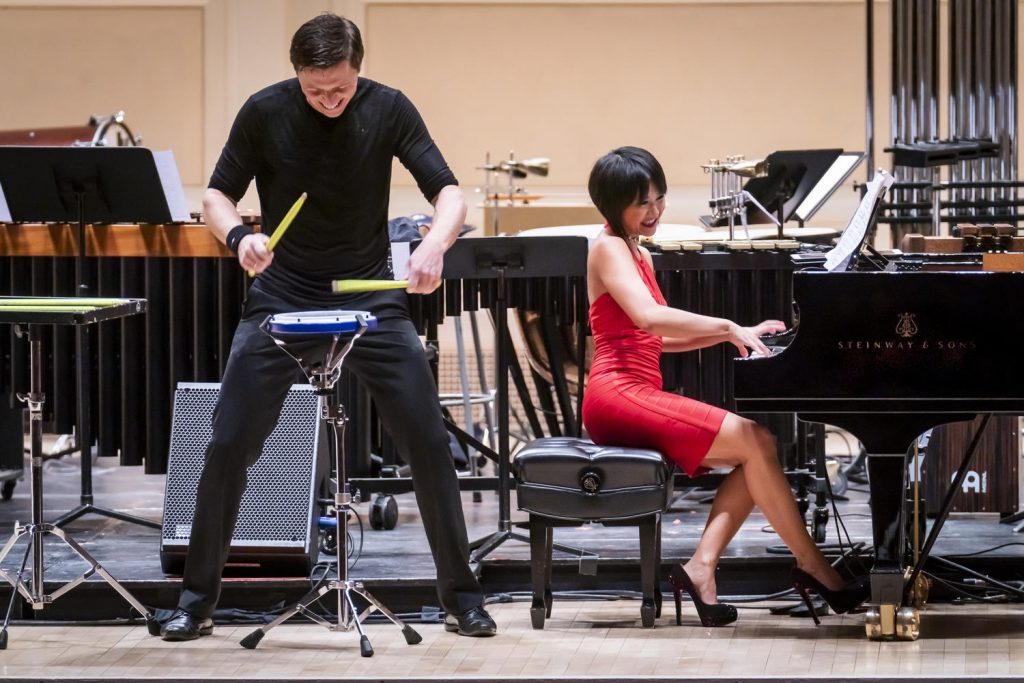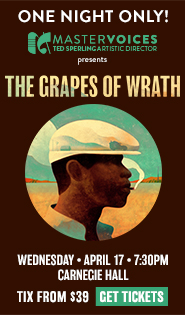Yuja Wang and percussion colleagues rock the house at Carnegie Hall

Yuja Wang and Martin Grubinger performed at Carnegie Hall Friday night. Photo: Chris Lee
Think of how a great rock band plays together in a way that is all about the playing itself—the groove, the energy, the locked-in tightness that also has a calm looseness—much less about who wrote the songs.
That kind of concert-going experience is rare in classical music, where the focus is almost entirely on how the musicians realize the work of the composer.
But then there’s Yuja Wang. The pianist is presenting one of Carnegie Hall’s Perspectives Series this season, and Friday night she brought in her current touring band, made up of four percussionists, and rocked the joint.
The concert was in the main a meeting of equals, with the phenomenal percussionist Martin Grubinger given lead billing as well. The two were supported by Alexander Georgiv, Leonhard Schmidinger, and Martin Grubinger Sr.
The elder Grubinger was essential to the program, as he arranged the two major works: Bartók’s Sonata for Two Pianos and Percussion and Stravinsky’s Le sacre du printemps, played by Wang and three percussionists. He also arranged two excellent contemporary works for the group, John Psathas’s percussion piece One Study, and the orchestral via-solo-piano Danzón No. 2, written by Arturo Márquez.
One could measure the imagination and intelligence of these in comparison to the well-known Bartók and Stravinsky. In this context, the former was a relatively simple replacement of one of the pianos with two marimbas, and the choice of that instrument did it all. Not only was the sound both darker and more delicate, but in this completely percussive music, the marimbas opened up a new expressive range. The simple device of switching from hard to soft mallets meant that, in the Lento ma non troppo, the attacks came with a slight delay, the sound ramping up from the initial contact. Though playing together as the lead instruments, the marimbas shadowed the piano, and made the music even more mysterious.
The Stravinsky arrangement was dazzling. One expected some loss of color, especially with no woodwinds, but Grubinger Sr. skillfully replaced the original colors—he played the opening bassoon solo on the vibraphone, and later the younger Grubinger played the weird bass clarinet riff on the marimba. There was a wide range of light and dark hues; the icy chords that open the Second Tableau were like frozen blades, and the percussive and rhythmic qualities of the original music were pushed to the maximum degree.
This was of course tremendously exciting and also illuminating. One of the pleasures of seeing percussionists play is watching them in physical action with the satisfying and direct correlation between what their bodies are doing and what sounds one is hearing. Just seeing Grubinger Sr play the polyrhythms of the “Procession of the Sage,” a different one with each hand, was dazzling.
And so was all the playing, which had Wang integrated as just another musician in the band. One is familiar with her agility, energy, and power, but that’s in the context of her solo playing, which is full of expressive rubato and dynamics.
Yet on Friday night, she was a great rhythm player, absolutely on point with the entire group for every attack, and every sixteenth note rest—each chord and line she played fit perfectly into what was happening around her.
That was impressive in Le sacre where the small group meant that the tempos for “Ritual of the Rival Tribes” and “Glorification of the Chosen One” were at Stravinsky’s indications, and added unusual physicality to the Sonata.
And it was more so for One Study and Dánzon No. 2.
Psathas, best known for his music for the 2004 Summer Olympics, is a masterful composer for percussion. One Study is a driving, perpetual motion work, with a virtuosic, extended solo for marimba—Grubinger’s playing was pure excitement. There are polyrhythms, cross rhythms, and accents that absolutely have to be on the downbeat. This is groove music in a way that the repetitive bass lines of so much current pop music could never be—groove music for the body, brilliantly rocking and with weight. A recurring phrase with Wang playing rising chords in the left hand, locked in with Grubinger, was thrilling physically, emotionally, and intellectually.
Dánzon No. 2 is a lovely, sinuous combination of Afro-Cuban rhythms with more than a little of Astor Piazzolla’s New Tango ideas about form and expression. This was still another chance for Wang to impress, to show that she could play a groove just slightly behind the beat, a groove meant for singing and dancing. If she had been wearing all black like the percussionists, she would have been just another player in the band.
And what a band. Grubinger is not just a great instrumentalist but a dynamic, charismatic force on stage, with energy like an arrow flying toward its target. He and Wang came out for an encore, she playing a piano arrangement of the Allegro molto from Shostakovich’s Chamber Symphony, Op. 110a, he adding groove to her own propulsion, playing a roto-tom with some acrobatic stickwork. One almost felt like dancing in the aisle.
Yuja Wang performs with violinist Leonidas Kavakos at Carnegie Hall 8 p.m. February 6. carnegiehall.org



Posted Oct 27, 2018 at 4:43 pm by Luigi Nonono
That this writer’s frame of reference for writing this review is rock-and-roll, it is no wonder he was dazzled by an artless, tasteless display, a sad excuse for music.
To even think of “arranging” such masterpieces is anathema, not that they are sacred cows, but that they are so perfectly complete as they are. I’m surprised she wasn’t banned from doing the Bartok as well as the Stravinsky. But how could a mere percussionist know such things? She continues to destroy classical music with her ignorance and tastelessness.
Posted Oct 30, 2018 at 5:29 pm by Michael Schefold
Dear Mr. Luigi Nonono. Seldom heard such a nonsense as you wrote about the best musicians alive. If there is good taste in music Yuja Wang has it. Her unpretentious interpretations full of musical insight and natural flow are- in matters of taste- only compearable with Rachmaninoff or Michelangeli.
Posted Oct 31, 2018 at 9:29 pm by Roman Markowicz
Thank you Mr.Nonono for allowing me to comment on your
opinions. But would you please do me a great favor and allow to comment on some facts. Do let me and all of us know when you’re ready……On opinions? No comment.
Posted Jun 03, 2019 at 5:31 pm by Bela Bartok
Luigi Nonono, it’s Bartok, just wanted to check in and see if everything’s ok – you seem a bit angry. Also, I have a very good feeling you were not present at this concert…